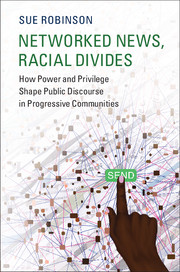Crossref Citations
This Book has been
cited by the following publications. This list is generated based on data provided by Crossref.
Hess, Kristy
and
Gutsche, Robert E.
2018.
Journalism and the “Social Sphere”.
Journalism Studies,
Vol. 19,
Issue. 4,
p.
483.
Vasudevan, Krishnan
2019.
Taxi Drivers as Reporters: Studying the Distinctive Journalism of the UTCC Voice Newsletter.
Journalism Studies,
Vol. 20,
Issue. 16,
p.
2443.
Steensen, Steen
Ferrer-Conill, Raul
and
Peters, Chris
2020.
(Against a) Theory of Audience Engagement with News.
Journalism Studies,
Vol. 21,
Issue. 12,
p.
1662.
Powers, Matthew
and
Russell, Adrienne
2020.
Rethinking Media Research for Changing Societies.
Belair-Gagnon, Valerie
and
Steinke, Allison J.
2020.
Capturing Digital News Innovation Research in Organizations, 1990–2018.
Journalism Studies,
Vol. 21,
Issue. 12,
p.
1724.
Lowrey, Wilson
and
Sherrill, Lindsey
2020.
Fields and Ecologies: Meso-Level Spatial Approaches and the Study of Journalistic Change.
Communication Theory,
Vol. 30,
Issue. 3,
p.
247.
Wenzel, Andrea D.
Ford, Sam
and
Nechushtai, Efrat
2020.
Report for America, Report about Communities: Local News Capacity and Community Trust.
Journalism Studies,
Vol. 21,
Issue. 3,
p.
287.
Wenzel, Andrea D.
2021.
Sourcing Diversity, Shifting Culture: Building “Cultural Competence” in Public Media.
Digital Journalism,
Vol. 9,
Issue. 4,
p.
461.
Hess, Kristy
and
Richards, Ian
2021.
Handbook of Global Media Ethics.
p.
635.
Wenzel, Andrea D.
and
Crittenden, Letrell
2021.
Reimagining Local Journalism: A Community-centered Intervention.
Journalism Studies,
Vol. 22,
Issue. 15,
p.
2023.
Mourão, Rachel R.
and
Molyneux, Logan
2021.
Tweeting Outside the Lines: Normalization and Fragmentation as Political Reporters Break from the Mainstream.
Journalism Practice,
Vol. 15,
Issue. 8,
p.
1089.
Friedland, Lewis A.
Shah, Dhavan V.
Wagner, Michael W.
Cramer, Katherine J.
Wells, Chris
and
Pevehouse, Jon
2022.
Battleground.
Mourão, Rachel R.
and
Brown, Danielle K.
2022.
Black Lives Matter Coverage: How Protest News Frames and Attitudinal Change Affect Social Media Engagement.
Digital Journalism,
Vol. 10,
Issue. 4,
p.
626.
Powers, Matthew
2022.
The Direction and Demographics of Journalists’ Trajectories: Evidence from One American City, 2015–2021.
Journalism Studies,
Vol. 23,
Issue. 3,
p.
392.
2022.
Information and Democracy.
p.
195.
Battocchio, Ava Francesca
Thorson, Kjerstin
Hiaeshutter-Rice, Dan
Smith, Marisa
Chen, Yingying
Edgerly, Stephanie
Cotter, Kelley
Choung, Hyesun
Dong, Chuqing
Moldagaliyeva, Moldir
and
Etheridge, Christopher E.
2023.
Who Will Tell the Stories of Health Inequities? Platform Challenges (and Opportunities) in Local Civic Information Infrastructure.
The ANNALS of the American Academy of Political and Social Science,
Vol. 707,
Issue. 1,
p.
144.
Usher, Nikki
2023.
The Real Problems with the Problem of News Deserts: Toward Rooting Place, Precision, and Positionality in Scholarship on Local News and Democracy.
Political Communication,
Vol. 40,
Issue. 2,
p.
238.



